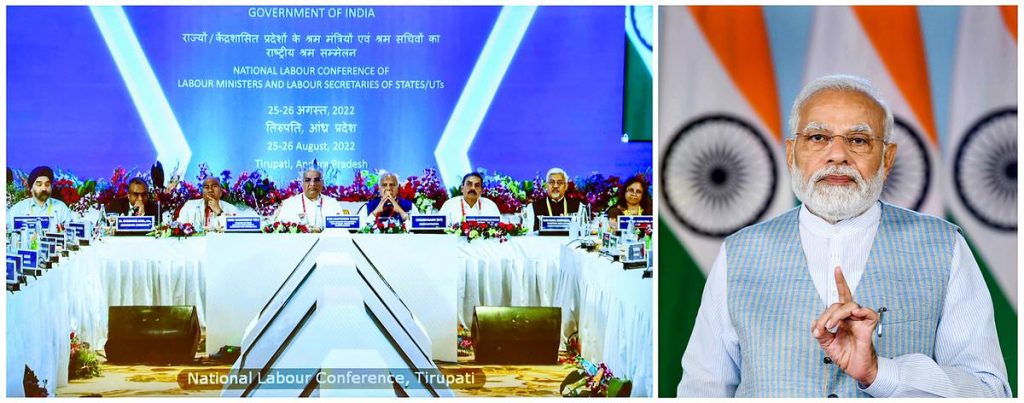By Dr. Gyan Pathak
Two-day National Labour Conference of labour ministers and labour secretaries of states and UTs concluded at Tirupati on August 26 which almost evaded the real issues against which the Joint Platform of the 10 Central Trade Unions have been agitating since 2019 when the Modi government got the Code on Wages passed in the Parliament of India, the first among the four controversial labour codes. The three others – the Code on Social Security, the Code on Industrial Relations, and the Code on Occupation Safety and Health – were passed in 2020. The conference though discussed several other important themes, and the Union Ministry of Labour and Employment proposes to come out with roadmaps on them to take the vision forward in the Amrit Kaal, ie in the next 25 years.
The National Labour Conference must not be confused with the Indian Labour Conference (ILC), the highest tripartite body in India for labour related policies and issues, the meeting of which never convened by the Modi government since 2015. Though the four labour codes have been claimed the prime minister Narendra Modi as the long overdue and the biggest labour reform in the independent India, the ILC has never been consulted. CTUs have alleged Modi government of “deceiving the public” through such conferences and the ongoing series of stakeholder discussions before rolling out of the labour codes. The Centre is not serious about discussing the far-reaching implications of the labour codes, but interested in only doing whatever they want to, they allege.
The Union Ministry of Labour Employment had organize this two-day National Labour Conference of Labour Ministers and Labour Secretaries of States and UTs at Tirupati, Andhra Pradesh on 25th-26th August, 2022. PM Modi had also virtually addressed the inaugural session on 25.8.2022. Union Ministers Shri Bhupender Yadav and Shri Rameshwar Teli, Administrator, UT of Chandigarh, Labour Ministers of States, Labour Secretaries of States and UTs and Government Officials were among those present on the occasion. In absence of participation of the Central Trade Unions and the representative of industries and business organizations, there was already not much hope among the agitating workforce in the country.
The Union Ministry of Labour and Employment press release has said that some important milestones have been covered at the event thanks to everyone’s positive participation. Obviously, the conference altogether avoided threadbare discussion on the real issues facing our workforce, who have been agitating for complete social security coverage, secured and quality jobs, and safety and security from the working hazards at workplace.
The “positive participation” turned out to be talking in favour of the labour reforms that the Modi government wants to implement in the country without caring for its devastating effect of workforce, including the modern day slavery. It would not be out of place to mention here that even the Supreme Court of India had said in a judgment last year in connection with the Central Scheme MGNREGA that payment delayed for months amount to “forced labour”. In the last two years of the pandemic almost entire workforce suffered “forced labour” conditions with great loss of earning and jobs in absence of social security coverage.
In his address, Prime Minister, inter alia, mentioned that India’s labour force has a huge role to play in realizing India’s dreams and aspirations to build a developed nation in the Amrit Kaal. The Union Labour Minister, Shri Bhupender Yadav gave an outline of the Conference and requested State Governments’ to give views and suggestions, and then thematic sessions were started with the aim and objective to facilitate the implementation of the labour reforms that the Modi government have been desiring to.
The first thematic session, viz, integrating e-Shram portal for onboarding social security schemes run by Central Government & State Governments to universalize social protection to workers and to improve employment opportunities for all, was deliberated upon. It was informed that over 28 crore unorganised workers from over 400 occupations have already been registered on e-Sham portal. SOP is being prepared for which a committee under Ministry has been constituted along with members from States as well. Based on the SOP finalised by the committee, e-Shram data will be shared with States and States will return verified data. This will help States in making policy driven decisions and implementation of welfare schemes. States expressed their views and gave suggestions on the theme, some of them with a mild criticism.
The second thematic discussed was Swasthya se Samriddhi for improving medical care and services through ESI hospitals run by State Governments and integration with PMJAY. Union Labour & Employment Minister mentioned that ESIC is committed to extend medical facilities to all districts by December, 2022, undertaken construction of 76 new hospitals, ready to recruit specialist for State run ESI hospitals. States stated, inter-alia, that ESIC is a standing example of cooperative federalism where states and central institutions work together for providing healthcare services to the labourers. States welcomed the revision in norms for setting up hospitals. States were requested to complete the formation of societies at the earliest for easy decision making, inputs for revision of norms for setting up new hospitals, modalities for setting up of medical college and hospital in aspirational districts.
The third thematic session was on framing of rules under four Labour Codes and modalities for implementation along with development of Portals for licensing, registration, returns, inspections etc. The last theme ‘”Vision Shramev Jayate @ 2047” focused on just and equitable future of work, social protection to gig & platform workers, gender equality at work and better opportunities to women.
Issues in these themes were ease of doing business and ease of living for workers, decriminalization of offense under Codes, development of integrated portal under for registration, one time license, compliance and returns; challenges in ensuring social security to Gig and platform workers and ways to address these; improving female labour force participation; skilling, lifelong learning aligned with future of work; skill gap mapping and facilitation of planned migration; sustainable financing of social security schemes. States gave important suggestions and status of rules making.
However, CTUs are not satisfied with this. They have demanded immediate holding of a session of ILC to discuss workforce related issues in all their dimensions along with scraping of the four controversial labour codes. (IPA Service)

 Saudi, Egyptian World Cup Bid To Learn From Qatar Experience
Saudi, Egyptian World Cup Bid To Learn From Qatar Experience 